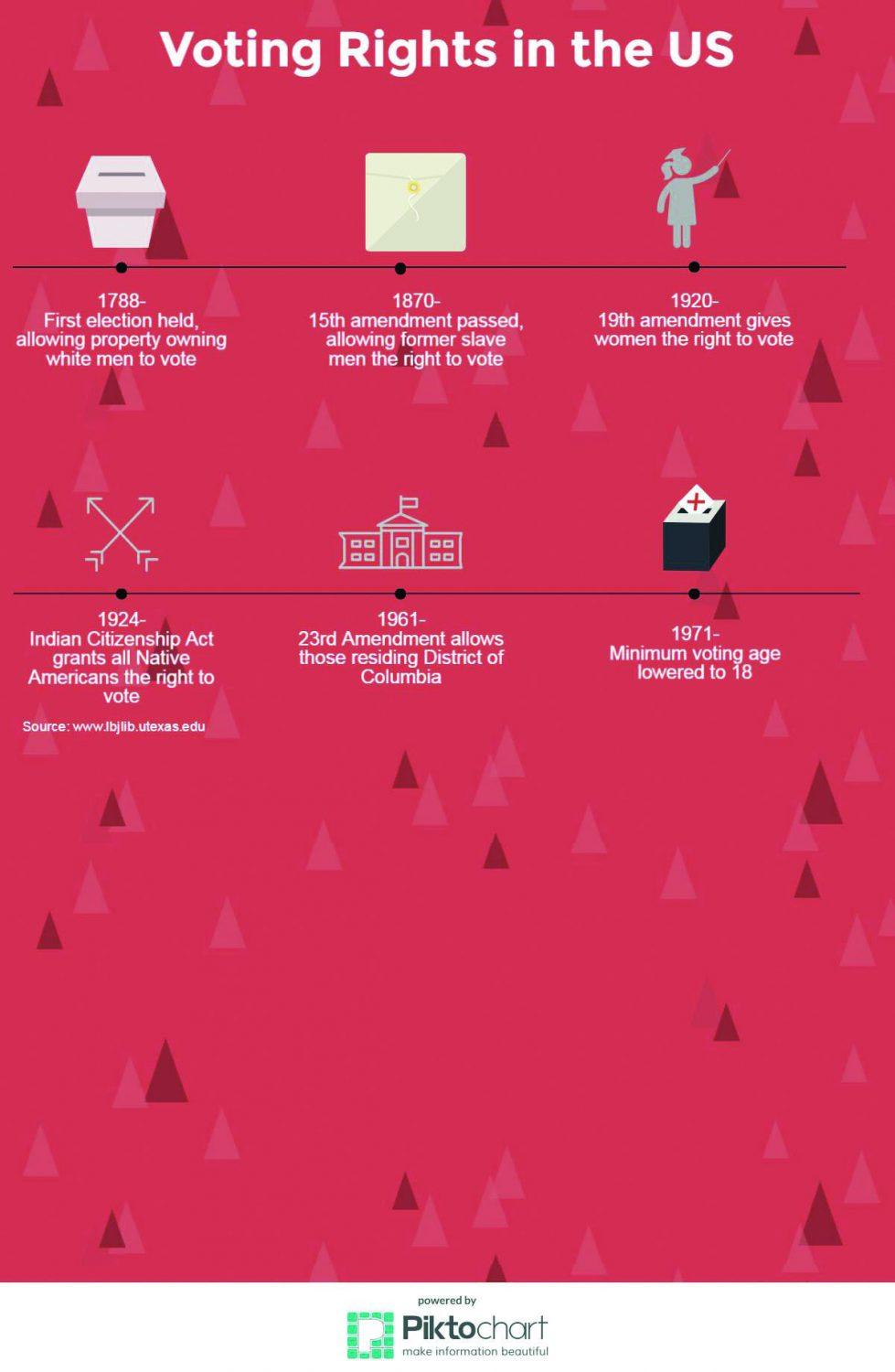Voice Your Vote: how students can directly influence the government
October 7, 2016
Over twenty four million young people, ages eighteen to twenty two, will have an opportunity to, for the first time, have a direct say in who runs the United States of America.
But only 45 percent of them will actually vote, based on the 2012 presidential election.
With their one vote, teen voters can use the power they hold in their government, according to Katie Szarkowicz, senior and political enthusiast.
“A lot of people take our country for granted. Even though there are some really sketchy, bad things about it, it’s not terrible, [and] we have the freedom to vote,” Szarkowicz said. “So many people in other parts of the world don’t have any say in their government and we have a direct say. So many people have fought for [our] right to vote, [yet some people] aren’t going to exercise their privilege?”
To exercise that privilege, potential voters can register one of three ways: in person, online, or by mail, explains Tara Frank, senior and registered voter.
“I registered at school, through [the League of Women Voters],” Frank said. “Basically, you bring your license and you fill out a form with all your personal information, like name, street address, and [the last four digits of your] social security number. And then they give you a little speech, you raise your right hand and recite the oath and then you get to keep a sheet that says you’re registered.”
But taking an oath doesn’t necessarily mean that newly registered voters truly understand how the American voting system works, according to Szarkowicz.
“I think a lot of people are confused. When casting a vote, a lot of people think you’re casting it directly to the candidate you’re voting for, when you’re actually casting for an elector who will vote in whatever way their state went,” Szarkowicz said.
In actuality, registered voters go to the polls on election day and select the party and candidate they wish to see in the White House. Rather than voting directly for the candidate, voters actually appoint electors. These electors have pledged to support the candidate that wins the popular vote in the state they represent. The candidate who receives a majority of the electoral votes, at least 270 out of the 538 available, will run the country for the next four years as President.
Even if a candidate wins the popular vote, they do not necessarily win the election. This has occurred four times, most recently happening in the 2000 election between Al Gore, who had one the popular vote, and George Bush, who won the Presidency.
Understanding how the voting system works is the first step to getting involved in the government. After that, a lot of effort is not required to be involved, Szarkowicz emphasizes.
“You don’t need an in-depth biography of the candidate,” Szarkowicz said. “If you don’t know where to start, a really easy thing to do is to go on twitter and [use the] ‘moments’ tab where you can swipe right to ‘Election 2016’. You don’t even have to read the stories; you could just look at the headlines for the major news of the day. It takes 30 seconds.”
Conducting research on the potential candidates is the most important step after registering to vote, according to Kyle Fleming, senior.
“The biggest thing is that people [will] always try to tell you their opinion when voting and they want you to vote how they think,” Fleming said. “[You have to] is to vote what you think is right and what you want to see in the future. Don’t get swooped in with all the hype, do your research.”
Once a voter has made their decision on which presidential candidate to vote for, they should remember to also chose their Senators, Representatives, and sometimes various community leaders, like the school board, come election day, Szarkowicz said.
“When you’re voting in the general election, at least in Illinois, is when you elect senators too. Change begins at a local level, which was what Bernie Sanders was saying. If you really want a big change in the government, start at a local level,” Szarkowicz said. “Vote for your mayors. Vote for your Senators. Vote for your representatives. Vote for your school board officials. Vote for your governors. It’s the little things that really add up.”
